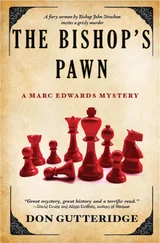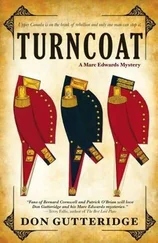Don Gutteridge - Dubious Allegiance
Здесь есть возможность читать онлайн «Don Gutteridge - Dubious Allegiance» весь текст электронной книги совершенно бесплатно (целиком полную версию без сокращений). В некоторых случаях можно слушать аудио, скачать через торрент в формате fb2 и присутствует краткое содержание. Год выпуска: 0101, Издательство: Touchstone, Жанр: Исторический детектив, на английском языке. Описание произведения, (предисловие) а так же отзывы посетителей доступны на портале библиотеки ЛибКат.
- Название:Dubious Allegiance
- Автор:
- Издательство:Touchstone
- Жанр:
- Год:0101
- ISBN:нет данных
- Рейтинг книги:5 / 5. Голосов: 1
-
Избранное:Добавить в избранное
- Отзывы:
-
Ваша оценка:
- 100
- 1
- 2
- 3
- 4
- 5
Dubious Allegiance: краткое содержание, описание и аннотация
Предлагаем к чтению аннотацию, описание, краткое содержание или предисловие (зависит от того, что написал сам автор книги «Dubious Allegiance»). Если вы не нашли необходимую информацию о книге — напишите в комментариях, мы постараемся отыскать её.
Dubious Allegiance — читать онлайн бесплатно полную книгу (весь текст) целиком
Ниже представлен текст книги, разбитый по страницам. Система сохранения места последней прочитанной страницы, позволяет с удобством читать онлайн бесплатно книгу «Dubious Allegiance», без необходимости каждый раз заново искать на чём Вы остановились. Поставьте закладку, и сможете в любой момент перейти на страницу, на которой закончили чтение.
Интервал:
Закладка:
But he did not go there. Instead, he picked up the unconscious body of his friend as gently as he could, laid it across his right shoulder, and began to trot back down towards the coulee, and the surgeon’s tent. He had taken only ten paces or so before he had to stop, drop to one knee, and catch his breath.
Somewhere behind him a tumultuous shout rose above the roar of battle. Marc turned to see where it had come from. Could it be Colonel Wetherall arriving from Chambly with reinforcements? Were they to be saved at the eleventh hour?
From the woods near the distillery several hundred fresh rebel troops came running across a ploughed field and a pasture, howling like Iroquois on a rampage. At the same time a second force materialized out of the bottomland along the river, threatening the cannon nearby. The defenders in the stone house had decided it was time to counterattack. But it was the approach of the group from the woods that brought Marc upright and incredulous. There wasn’t a single gun amongst them. They were armed with pitchforks, axe-handles, and mattocks-and a fury fueled by hunger, humiliation, and the knowledge that some kinds of death are more necessary than others.
Suddenly, cries of “Fall back!” could be heard, faintly, from the lips of officers. Men were scampering backwards past Marc. He picked up Hilliard as he would a child, and joined them, Rick’s breath still warming his right cheek.
Moments later, a bugle sounded the unthinkable: three hundred British regulars-heirs to the reflected glories of Waterloo, Culloden, and Agincourt-were in full retreat: beaten back by a rump parliament of farmers, tradesmen, and ordinary folk of every ilk.
* * *
Marc’s horse plodded wearily but dutifully alongside the scarlet ambulance-wagon that carried several of the wounded men, including Rick Hilliard. A light snow was falling, silent and peaceful, upon the length of the retreating column. It was after midnight, and they had just pulled out of St. Ours, little more than halfway to Sorel. Fortunately, one of the foraging parties had discovered a cache of potatoes in a barn en route, and Colonel Gore had consented to let the men stop long enough to roast them over an inconspicuous fire. Now they were back on the river road, the exhaustion of defeat added to the physical and mental fatigue exacted by the preceding thirty hours. A few of the mounted militia rode in desultory loops about the flanks of the column, but no organized pursuit or ambush materialized to harry them or provide some welcome distraction from the brooding weight of their failure.
Rick had had his abdominal wound dressed to the point where any external bleeding had been stanched, but what was happening internally could only be guessed at. Rick remained unconscious. His breathing was either shallow or intermittently sharp and aching. Marc had removed his greatcoat and wrapped Rick in it. He never left his friend’s side, fearing that a sudden pain might cause him to move abruptly and loosen the cotton packing that had stopped the bleeding. But the only movement so far had been the anxious rise and fall of his breathing.
The retreat from St. Denis had been neither orderly nor dignified. Once again Colonel Gore had not let the possibility of such a manoeuvre enter his wizened imagination. As a result of their initial haste, three or four wounded men had been abandoned on the battlefield, left to the tender mercies of the rebels. The twenty-four-pounder was dragged down from its useless perch (sixty of the sixty-eight rounds having been expended), limbered, and hauled towards the makeshift log-bridge constructed earlier in the day. But after bearing the weight of almost three hundred retreating men and a dozen wagons, the bridge collapsed of its own volition just as the cannon was crossing it. The gun was tossed sideways into the muddy water. With enemy skirmishers harassing them on three sides, and the danger of more cutting off their retreat as they crossed the river, Gore continued to shriek commands at the exhausted men and beasts. Half a dozen of the latter died in the traces and had to be replaced by cavalry horses. The gun was hopelessly stuck, but Gore refused to abandon and spike it until the surgeon warned him that the men themselves would soon die beside the animals. As a result of this unnecessary delay, it had been dark before the column got started up the river road towards St. Ours and Sorel. The whoops of triumph from the rebels sang in their ears like a bully’s taunt. Fortunately, they were permitted to slink away, licking their wounds.
No-one spoke. They were too numb to complain. It took energy to moan. The dried mud on their uniforms had caked and, whitened by the snow, made the men resemble perambulating ghosts. Marc was trying hard not to think about his own brush with death, about Rick’s savage anger and quixotic courage, about the colonel’s stubborn stupidity, about the patchwork army of half-starved youths who had humiliated them. There was nothing Napoleonic or glorifying about Papineau’s forces: they were fighting only to live, and be.
“Could you spare a smoke?”
The sound of an English voice uttering a full sentence startled Marc, and he glanced about in search of its author. None of the men tramping near him had looked up or shifted his rhythm.
“I think I’d feel better if I just had a puff. . ”
It was a soft voice, weakened by fatigue or pain. And it came from the wagon carrying the severely wounded. Marc peered over the still form of Rick Hilliard and saw that the bundle of blankets next to him had suddenly produced a head and an arm. Marc swung down off his mount and began to walk alongside the wagon. He found himself face-to-face with the young cavalryman he had rescued from under his dying horse. He was propped up on one elbow and smiling.
“Is it night, or is this Hell?”
“Both,” Marc said. “You’ve been asleep for hours. How are you feeling?”
“Well, I’ve got a splint on my best leg, which is throbbing like a dozen toothaches, and I got bruises on my bruises. But I’m alive.”
“And if the sawbones has set your break well, you’ll live to ride another horse.”
“But he won’t be Prince.”
“I’m sorry about that.”
“It was my brother’s horse. I promised to keep him out of harm’s way.”
“There’s no such place in a war. Which is what we’ve started, I’m afraid.”
“Did we beat them?”
“They beat the piss out of us. We’re on the run.”
“Ah. .”
“You don’t sound too disappointed.”
“I didn’t think when I joined up that we’d be shootin’ up a bunch of farmers with pitchforks and old geezers with rickety muskets.”
Marc said nothing to that, but thought much. “I’m only halfway through my pipe; why don’t you finish it for me.”
“Thanks. And thanks for what you-”
“You’d better take a drink before you start.” Marc put his canteen to the lad’s lips, and after a tentative sip he gulped down several mouthfuls.
“My name’s Eugene Yates.”
“Lieutenant Marc Edwards.”
For the next minute or so Marc walked silently beside the wagon while Corporal Yates drew in lungful after lungful of smoke from Marc’s clay pipe.
“I’m a bit of a farmer myself,” he said to Marc, resting his head back on an improvised pillow and returning the pipe. “I grew up in Montreal, where my father is a merchant. But my older brother Stephen married a girl from New York State and moved to her family’s farm just outside the village of Waddington. A pretty little farm that runs right down to the St. Lawrence. When Callie’s dad died, she and Stephen took over the place, and they asked me to come down and join them when I turned eighteen.”
“That was some time ago.”
Читать дальшеИнтервал:
Закладка:
Похожие книги на «Dubious Allegiance»
Представляем Вашему вниманию похожие книги на «Dubious Allegiance» списком для выбора. Мы отобрали схожую по названию и смыслу литературу в надежде предоставить читателям больше вариантов отыскать новые, интересные, ещё непрочитанные произведения.
Обсуждение, отзывы о книге «Dubious Allegiance» и просто собственные мнения читателей. Оставьте ваши комментарии, напишите, что Вы думаете о произведении, его смысле или главных героях. Укажите что конкретно понравилось, а что нет, и почему Вы так считаете.












